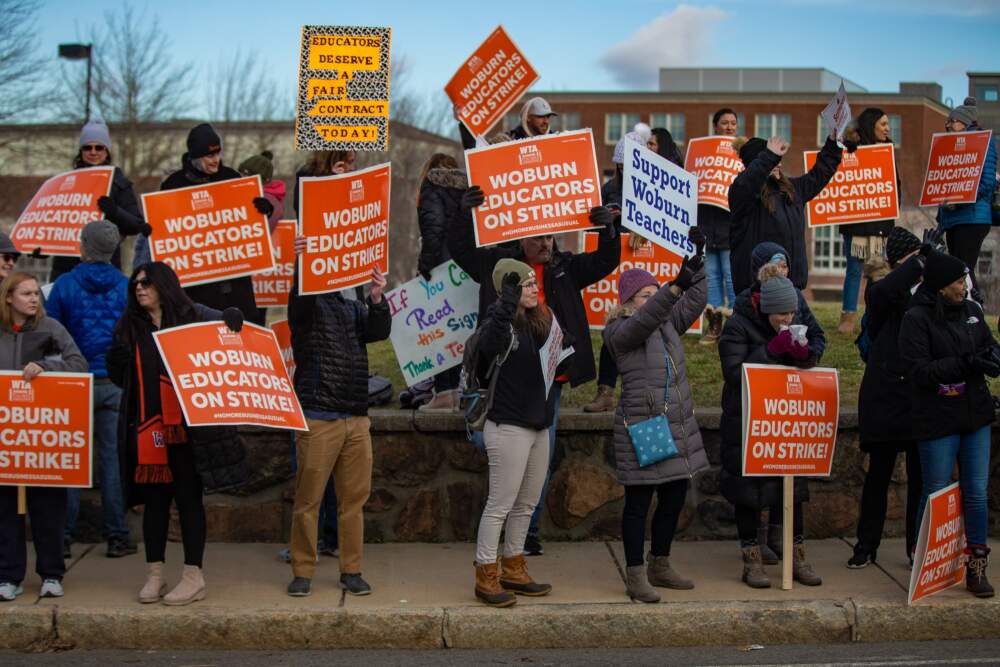Advertisement
Proposed bill would give striking workers unemployment benefits

Workers who are on strike for more than 30 days could be eligible to receive unemployment benefits under legislation that union members say is necessary to ensure collective bargaining talks are fair and balanced.
Sen. Paul Feeney said proposals that he and Rep. Lindsay Sabadosa filed represent a "powerful tool" to level the playing field for employees as they negotiate wages, schedules, job security and working conditions with corporate employers.
Feeney told lawmakers Tuesday that labor strikes are the last resort for workers who deserve safety-net benefits as they struggle to cover expenses for their family — including paying for health care — while they're not on the job. The Foxborough Democrat is rooted in the labor movement, and previously worked as legislative director and spokesman for IBEW Local 2222 for nearly nine years.
"The corporation or employer in the middle of often contentious collective bargaining can weaponize certain unemployment benefits to coerce action and activity that is favorable to the employer and that adversely affects the worker," Feeney said during a Joint Committee on Labor and Workforce Development Committee hearing. "We've seen a patchwork of decisions over the years regarding unemployment depending on who the governor is and who the secretary of labor is on whether or not unemployment benefits would actually be paid."
The proposals could remove legal hurdles under existing statute that people face during labor disputes as they try to prove their eligibility for unemployment benefits, a Feeney aide told the State House News Service.
The current law about workers' rights to obtain unemployment benefits is "murky," said Megan Collins, associate director of the Massachusetts Nurses Association's division of legislation and government affairs.
Collins invoked the uncertainty and confusion surrounding a nearly 10-month nurses' strike at St. Vincent Hospital in Worcester that started in 2021 and ended last year. Collins told lawmakers that workers often must rely on help from the governor to receive benefits, but she said "that's not the way we should be running our unemployment for our workers in Massachusetts."
The National Federation of Independent Business opposes the bills. Christopher Carlozzi, Massachusetts director of NFIB, warned in written testimony that the state's unemployment insurance system is at a "critical point," which is exacerbated by the Baker administration erroneously using roughly $2.5 billion in federal dollars to cover jobless benefits.
"Now is not the time to encourage increased use of the unemployment trust fund in its fragile state. Especially when it comes to interfering in negotiations between businesses and labor unions," Carlozzi said in written testimony shared with the News Service. "The Legislature should refrain from additional stress on the unemployment system right now."
Advertisement
Carlozzi told the News Service the bill gives workers an advantage while they strike.
Still, Feeney said he hopes his proposal sees the "light of day in our chambers" this session. A similar Feeney bill was reported favorably out of committee last year and referred to the Senate Ways and Means committee, which took no further action on it.
Martin Sweeney, a longtime Verizon employee, began cancer treatment in March 2016 before a seven-week strike ensued. Sweeney told lawmakers that even if he tried to save money for the next decade, he still wouldn't have enough to cover the expenses he incurred during the strike, when he couldn't pay his mortgage or medical bills.
"This legislation, to me, just represents an opportunity for our leadership, the union leadership, to bargain in good faith with these corporations that have all the leverage over us," Sweeney said at the hearing. "They determine how long we're on strike — We don't. We're just looking for a fair shake."
Workers may not fully participate in strikes because they fear the financial implications of not receiving a regular paycheck, said Jeremiah Poirier, president of IBEW Local 2325. But providing unemployment benefits during strikes would "empower workers to exercise their right to protest," he told lawmakers.
"These benefits protect vulnerable workers from potential exploitation by their employers who will take advantage of their financial insecurity," Poirier said.